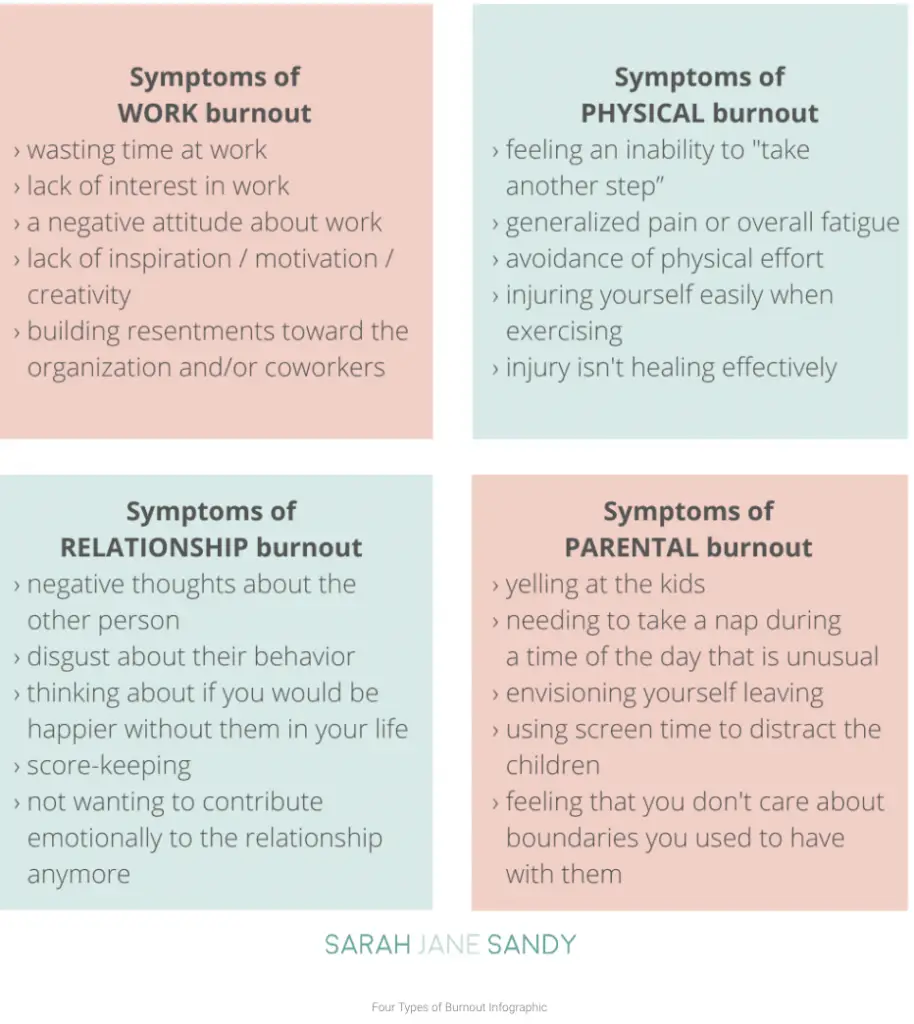

Irritable? Anxious? Overwhelmed? Unable to focus or concentrate? Having trouble sleeping despite being exhausted?
If you’re experiencing any of the above, you may be burnt out.
You may also be feeling incredibly fatigued, more pessimistic than normal, and lacking motivation and inspiration, or just feeling stagnant where you’re at.
All of those are symptoms of burnout.
Burnout has been described as a state of emotional, physical, and mental exhaustion caused by excessive and prolonged stress. It occurs when you feel overwhelmed, emotionally drained, and unable to meet constant demands.
While burnout can be experienced in multiple facets of our lives, when it strikes, it often presents the same way: it feels like we are unable to give any more of ourselves.
And burnout is a beast.
With the state of the world right now – COVID, political drama, back to school, holidays, work stress – it all starts to pile up, and more and more people are experiencing burnout.
But let’s not be all doom and gloom – let’s get you some good news:
YOU HAVE THE POWER TO CHANGE THE SITUATION AND OVERCOME YOUR BURNOUT.
I’m going to give you my favorite tools for your toolbox – the tips and tricks that will help you combat burnout and maintain your immune health, which is key to avoiding a total physical breakdown
Burnout can generally be categorized into four main areas: work, physical, relationship, and parental burnout. You may experience symptoms in one area, or even all areas, AND THAT’S OK. It makes you human to feel burnt out. And know that you can change the situation with the right tools and support. That’s what this blog post is all about!
Note that the following symptom lists are not inclusive – you may feel one or more, or you could be experiencing symptoms beyond what’s listed.

Do you find yourself fitting into any of those boxes?
Maybe more than one box?
THAT’S NORMAL.
Knowing where in your life you’re feeling burnt out will help you figure out why you’re feeling the way you are.
We can break it down into three causes:
Lack of control: feeling like you have no control over your future, or the position you are currently in.
Difficult environment: being in a physical workspace, home, or relationship that is negative or chaotic.
And the most common cause of all —
Lack of balance: too much work, not enough play; too much parenting, not enough solo time; and giving too much in a relationship and not having it feel reciprocated are all examples of lack of balance.
I’m going to preface this by saying: if you are currently experiencing burnout, any (or all!) of the suggestions below might feel hard to implement. I get that. Introducing new things to your routine can be daunting and overwhelming, especially when you’re already in a space of exhaustion.
Take a deep breath.
In through your nose.
Out through your mouth.
Now do that again. And then again.
And let’s take some baby steps together.
Don’t implement everything all at once – you’ll be more likely to quit all of them. Introduce one at a time and, once your body and mind realize how good you’re starting to feel, introducing another task will seem more doable.
Ok? Got it?
Let’s do this!
Move your body every.single.day.
It can even just be for 30 minutes.
Moving your body is critical for your body and mind to function optimally.
It’s almost probably the most intimidating one to start.
In times of stress, it’s often tough to find the motivation to exercise, but it is so important for both your mental and physical health. Find a movement that you like and look forward to – something as simple as walking (get out in nature and enjoy some forest bathing!), to at-home HIIT workouts, yoga, biking, pilates, or anything in between.
Did you know that research has found that exercise can increase emotional resilience in the way you handle stress?
Exercise produces endorphins which help decrease tension, elevate mood, improve sleep, and boost self-esteem … all of which are basically non-existent when you’re burnt out.
I’m personally a big fan of yoga – it moderates the nervous system, balances hormones, and regulates nerve impulses, three factors that can reduce stress levels, making you better equipped to handle stressful situations. A regular yoga practice can also reduce blood pressure and heart rate, lower cortisol and inflammation, and promote beneficial changes in the brain.
I encourage you to do what you love – things that feel invigorating and positive, instead of depleting. This is different for each person. You might find solace in yoga, or get an endorphin high from hitting the trails on your bike. Or you might find peacefulness in a long hike in nature.
Whatever movement you do to feel good, DO IT OUTSIDE so you’re getting a hit of that Vitamin D as well! And we could all use more fresh air and sunshine in our lives these days.

When you’re burnt out, one of the first things to go out the window is your immune system. You’re not eating properly, you’re not sleeping properly, you’re exhausted and just not taking care of yourself. It’s hard to make that a priority – I get it – and that’s where high-quality, bioavailable supplements come in.
Aside from the obvious – moving your body daily (preferably outside), eating a nutrient-dense diet, and staying mega hydrated – a cure-all for everything! – these are my favorite supplements to keep your immune system in tip-top shape:
Vitamin D: 1 capsule (5000 IU) daily with a meal (that includes a healthy fat) as maintenance. If you get an active sickness, double the dose for two weeks. Vitamin D is – hands down – the most important nutrient to be supplementing with to protect you and bolster your immune system.
Probiotics: 1 capsule daily. The health of your gut is paramount to the health of your immune function.
Vitamin C: 1 teaspoon daily. Without a doubt, Vitamin C is one of the most popular (for good reason!) vitamin to enhance immune system health. You can also take it in capsule form if you prefer – I like this one, or if you would prefer a powder to mix in liquids, this one is delicious (and your kids can take it too!).
N-Acetyl Cysteine (NAC): 1 capsule, twice daily. This is an amino acid complex that is the precursor to glutathione production, the body’s most powerful antioxidant, and helps promote optimal detoxification and immune system health.
Zinc: 1 capsule daily. Zinc is a mineral which drives the immune system, catalyzing its biochemical maintenance and function. Because zinc is not well represented in foods, most people are zinc deficient. A healthy zinc level is important for the function of the immune system because it is essential for immune-cell development.
Melatonin: take ½ lozenge at bedtime. Melatonin is best known, and most commonly used, to boost sleep and reduce anxiety, both of which improve the immune system. Melatonin is also a potent antioxidant, the free radical fighting nutrients that are critical for immune support.
What do you need?
Do you feel supported?
Are you taking care of yourself?
Are you setting needed boundaries?
Do you need a break?
Burnout can lead to a lack of motivation, which can lead to a withdrawal from the world in an avoidant way. It’s important to sort out where that avoidance is rooted.
And, on that note …
Self care doesn’t just mean throw on a facemask, light a candle, and ease into a hot bath.
I mean, it CAN mean that, but that isn’t all it means.
Self care has been defined as, “a multidimensional, multifaceted process of purposeful engagement in strategies that promote healthy functioning and enhance well-being.” Self care is vital for building resilience toward those stressors in life that you can’t eliminate.
Unfortunately many people view self-care as a luxury, rather than a priority.
Self care isn’t a one-size-fits-all strategy. Your self care plan will need to be customized to your needs. Assess which areas of your life need some more attention and self care. And reassess your life often. As your situation changes, your self-care needs are likely to shift too.
Physical Self Care
You need to take care of your body if you want it to run efficiently. Keep in mind that there’s a strong connection between your body and your mind. When you’re caring for your body, you’ll think and feel better too.
▵ Are you getting adequate sleep?
▵ Is your diet fueling your body well?
▵ Are you spending time outside in nature?
▵ Are you getting enough exercise?
Social Self Care
Socialization is key to self care, because close connections are important to your well-being.
▵ Are you getting enough face-to-face time with your friends?
▵ What are you doing to nurture your relationships with friends and family?
Mental Self Care
Mental self care involves doing things that help you stay mentally healthy – like practicing self-compassion and acceptance,to help you maintain a healthier inner dialogue.
▵ Are you making enough time for activities that mentally stimulate you?
▵ Are you doing productive things to help you stay mentally healthy?
Spiritual Self Care
Nurturing your spirit can involve anything that helps you develop a deeper sense of meaning, understanding, or connection with the universe.
▵ What questions do you ask yourself about your life and experience?
▵ Are you engaging in spiritual practices that you find fulfilling?
Emotional Self Care
It’s important to have healthy coping skills to deal with uncomfortable emotions, like anger, anxiety, and sadness. Emotional self-care may include activities that help you acknowledge and express your feelings on a regular basis.
▵ Do you have healthy ways to process your emotions?
▵ Do you incorporate activities into your life that help you feel recharged?

This one is a tough one.
But, I encourage you to make a list of things that need to get done.
Not, a to-do list per se, but an ongoing list of tasks that you need or WANT to be completed at some point.
Now go through that list and decide what you can delegate to someone else.
Ask for support.
Get that off your plate, and move onto the next task.
Asking for help is HARD. But, the reality is, you can’t go through life doing everything on your own. Release control, tuck your pride away for just a moment, and ask for help.
And, while we’re asking for help, let’s get a support system together.
It can be a friend, partner, colleague, even a therapist. Have someone that you’re comfortable checking in with, talking to, and make sure it’s someone who helps you feel good.
If you know that your nutrition and physical health are suffering, reach out to me for support! I’m here to support, educate and help you get your nutrition and overall physical health in check so at least that’s one thing you don’t have to worry about.
1. Burnout is a beast. While burnout can be experienced in multiple facets of our lives, when it strikes, it often presents the same way: it feels like we are unable to give any more of ourselves.
2. If you’ve been feeling burnt out, go easy on yourself. I have a toolbox of tips and tricks to help you combat burnout.
3. Self care is more than just bubble baths and facemasks – it encompasses all aspects of your life and you have the power to pick and choose where you need to practice self care.
Burnout symptoms vary depending on which phase of burnout you’re in. In general, there are three symptoms to be aware of: exhaustion, depersonalization, and reduced personal accomplishment.
exhaustion This fatigue presents itself both mentally and physically. The energy you typically have is zapped by persistent exhaustion.
depersonalization This is a feeling of indifference. In other words, you start to feel numb. For example, you may become more cynical in your inner workings or lack the ability to communicate effectively with people.
reduced personal accomplishment/performance This tends to manifest when you feel your work is insufficient and you’re incapable of performing your work. For example, you may lose pleasure in work you previously received joy from. Your usual creativity may wane, and it can become harder to concentrate. Symptoms may also present as physical, emotional or behavioral.
physical symptoms of burnout
〰️feeling tired all the time
〰️having difficulty sleeping
〰️experiencing a change in appetite
〰️chronic headaches or muscle pain
emotional symptoms of burnout
〰️lacking motivation
〰️experiencing feelings of self-doubt
〰️failure or loneliness
〰️an overall feeling of dissatisfaction
behavioral symptoms of burnout
〰️social isolation
〰️not performing your responsibilities
〰️work-related anger outbursts
Burnout isn’t a sudden onset of feelings—instead, your thoughts, feelings, and actions progress through a series of stages. Herbert Freudenberger, an American psychologist, described the progression of burnout in 12 stages, but this was later simplified into a 5-stage version that is described below.
honeymoon phase Like a honeymoon phase in a marriage, this stage comes with energy and optimism. Whether it is starting a new job or tackling a new task, it’s common to experience satisfaction that leads to periods of productivity and the ability to tap into your creative side. In this first phase of burnout, you may begin to experience predicted stresses of the initiative you’re undertaking, so it’s important to start implementing positive coping strategies. The theory is that if we create good coping strategies at this stage, we can continue in the honeymoon phase indefinitely.
onset of stress The second stage of burnout begins with an awareness of some days being more difficult than others. You may find your optimism waning, as well as notice common stress symptoms affecting you physically, mentally, or emotionally.
chronic stress The third stage of burnout is chronic stress. This is a marked change in your stress levels, going from motivation, to experiencing stress on an incredibly frequent basis. You may also experience more intense symptoms than those of stage two.
burnout Entering stage four is burnout itself, where symptoms become critical. Continuing as normal is often not possible in this state as it becomes increasingly difficult to cope. We all have our own unique limits of tolerance, and it’s key that you seek intervention at this stage
habitual burnout The final stage of burnout is habitual burnout. This means that the symptoms of burnout are so embedded in your life that you are likely to experience a significant ongoing mental, physical or emotional problem, as opposed to occasionally experiencing stress or burnout.
Dealing with burnout typically involves first recognizing what you’re feeling—and then trying to lessen the stressors … but things that lead to burnout are usually not totally within our control. It’s important to control what you can, and learning to manage your daily stressors with more ease is one of them. Here are five steps that can help: H2: reframe your mindset Consider the role you’re burned out from and remind yourself why you started, as that can help you view your situation in a more positive light.
prioritize self-care A lot of people believe that they don’t have enough time in their schedule for self-care, which often leads to burnout. If that sounds like you, start small. It doesn’t have to be an hour each day—it may look like spending 10 minutes a day engaged in a gratitude practice or a guided visualization. The important thing is that you intentionally carve out time. How you spend that dedicated time may change according to your needs of the day; however, prioritizing adequate amounts of sleep, a healthy diet, and exercise are good places to start. H2: ask for help Let your partner, family members, friends, boss, coworkers, or whoever else is close to your situation know you’re exhausted and maxed out. Don’t be afraid to ask them for help, and be specific about what you need. Ask for help with meals or carpools to pick up kids from school or activities.
maintain social interaction Sometimes it helps to talk about what you’re going through with family and friends. Sometimes it helps to use social time to step away from stressors and simply use the time to enjoy another person’s company. Either way, social contact can be an excellent way to de-stress. And when it comes to carving out time for friends—don’t wait for free time, create it.
set boundaries When you’re not working, leave your work behind. When you can step away from other responsibilities that are causing burnout (like caregiving), do so. Setting boundaries also means not overextending yourself. Don’t be afraid to turn down an invitation on the weekend if your schedule is already full and you need extra time to recharge. Remember that you can’t pour from an empty cup.
Get pregnant naturally, improve your odds in IVF, and prevent miscarriage with my 12-week course, The Fertility Code.
The Fertility Code is the best-kept secret of women who want to take the guesswork out of conceiving, and give themselves every possible chance of getting, and staying, pregnant successfully.
Bringing together evidence-based information, science-backed protocols, a personalized approach, and nurturing practices, this course is for anyone who is struggling to get pregnant, or thinking about getting pregnant soon. The course is a one-stop-shop for getting your body, mind and soul prepared for conception.
In less than 3 months, you will learn exactly what you need to do now to get pregnant successfully and have a healthy full term pregnancy.
Sarah Jane Sandy is a certified nutrition therapist, and a fertility and women’s health expert. She has helped hundreds of women increase their fertility naturally and go on to have healthy full-term pregnancies. She has been working with women and couples trying to get pregnant for over 15 years and over 90% of the women who work with her get pregnant and have healthy babies. Learn more about her own fertility journey here. To send Sarah a message, complete her Contact Form.



© 2026 Sarah Jane Sandy. All rights reserved. Privacy Policy | Terms and Conditions |
Medical Disclaimer

Curious about your fertility health? Take this simple quiz to find out what factors may be harming your fertility, and learn what you can do about it!